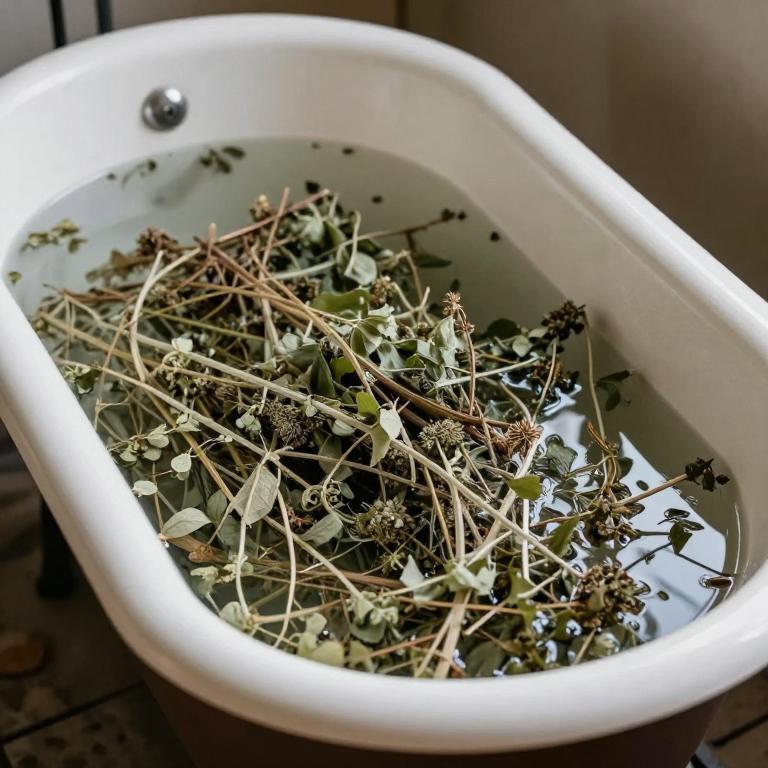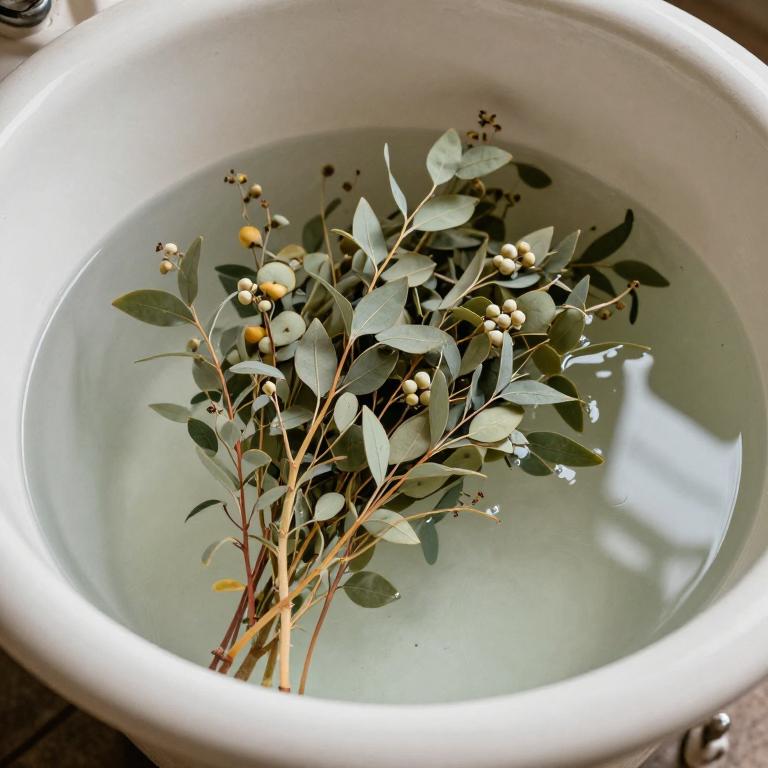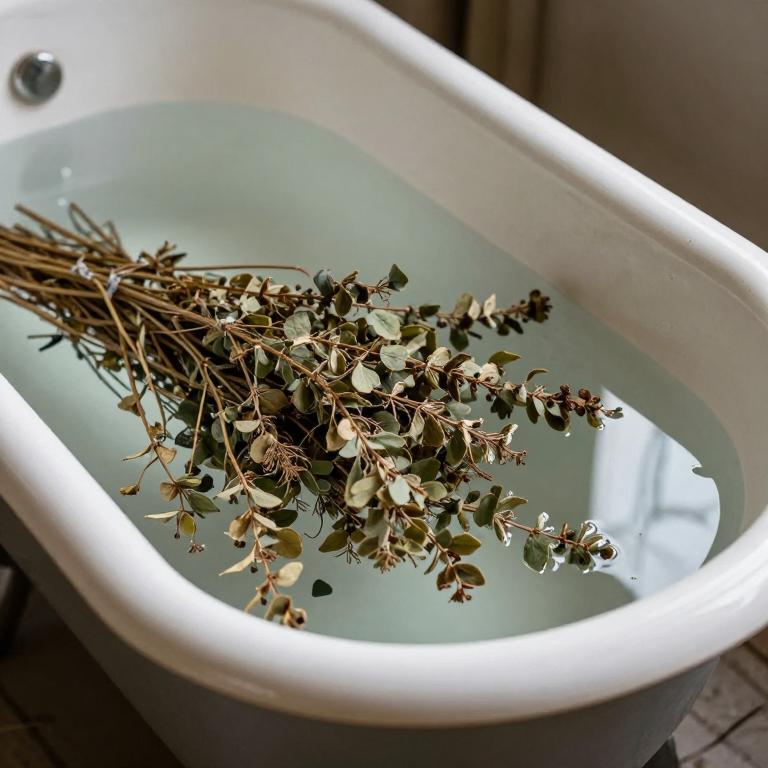10 Best Herbal Baths For Foot Odor

Herbal baths can be an effective natural remedy for foot odor, as they help to cleanse and deodorize the feet using the antimicrobial and soothing properties of various herbs.
Commonly used herbs such as lavender, eucalyptus, and tea tree oil are known for their ability to combat bacteria that contribute to unpleasant smells. To prepare an herbal bath, simply add a few drops of these essential oils or a handful of dried herbs to warm water and soak your feet for 10 to 15 minutes. This practice not only helps reduce odor but also promotes relaxation and improves circulation.
Regular use of herbal baths can be a simple, cost-effective way to maintain fresh-smelling feet without the need for harsh chemical deodorants.
Table of Contents
- 1. Rosemary (Rosmarinus officinalis)
- 2. English lavender (Lavandula angustifolia)
- 3. Eucalyptus (Eucalyptus globulus)
- 4. Thyme (Thymus vulgaris)
- 5. Greek oregano (Satureja hortensis)
- 6. Melaleuca (Melaleuca alternifolia)
- 7. Ceylon cinnamon (Cinnamomum zeylanicum)
- 8. Ginger (Zingiber officinale)
- 9. Oregano (Origanum vulgare)
- 10. Pogostemon (Pogostemon cablin)
1. Rosemary (Rosmarinus officinalis)

Rosmarinus officinalis, commonly known as rosemary, is a fragrant herb that has been traditionally used for its aromatic and therapeutic properties.
When incorporated into herbal baths, rosemary can help alleviate foot odor by promoting circulation and reducing the growth of odor-causing bacteria. The essential oils in rosemary possess antifungal and antimicrobial qualities that make them effective in neutralizing unpleasant smells. To use rosemary in a foot bath, simply steep fresh or dried rosemary in warm water and soak your feet for 15 to 20 minutes.
This natural remedy not only helps combat foot odor but also provides a relaxing and invigorating experience for the feet.
2. English lavender (Lavandula angustifolia)

Lavandula angustifolia, commonly known as English lavender, is widely used in herbal baths to combat foot odor due to its natural antifungal and antibacterial properties.
When infused into bath water, lavender essential oil helps to neutralize the bacteria and fungi that contribute to unpleasant foot smells. The calming aroma of lavender also promotes relaxation and soothes the skin, making it a pleasant addition to a foot care routine. To prepare a lavender bath, simply add a few drops of lavender essential oil or a handful of dried lavender flowers to warm running water.
Regular use of lavender-infused baths can help maintain fresh-smelling feet and improve overall foot hygiene.
3. Eucalyptus (Eucalyptus globulus)

Eucalyptus globulus, commonly known as the Australian blue gum, is often used in herbal baths to combat foot odor due to its antimicrobial and astringent properties.
When added to warm water, the essential oils from eucalyptus globulus help to kill odor-causing bacteria and fungi that thrive in damp, warm environments like the feet. The refreshing scent of eucalyptus not only masks unpleasant smells but also provides a soothing and invigorating effect on the skin. Regular use of eucalyptus globulus herbal baths can help maintain clean, dry feet and reduce the risk of fungal infections.
This natural remedy is a safe and effective alternative to commercial antifungal products, offering both therapeutic and aromatic benefits.
4. Thyme (Thymus vulgaris)

Thymus vulgaris, commonly known as thyme, has been traditionally used in herbal baths to address foot odor due to its antimicrobial and antifungal properties.
When infused into water, thyme essential oils help eliminate the bacteria and fungi that contribute to unpleasant foot odors. A thyme herbal bath can be prepared by steeping fresh or dried thyme in hot water for several hours before soaking the feet, allowing the beneficial compounds to be absorbed through the skin. Regular use of thyme baths may help maintain a cleaner, drier environment for the feet, reducing the likelihood of odor-causing microorganisms thriving.
While thyme is generally safe for most people, individuals with allergies or sensitivities should perform a patch test before using it extensively.
5. Greek oregano (Satureja hortensis)

Satureja hortensis, commonly known as summer savory, is a herb that has been traditionally used for its aromatic and therapeutic properties.
When incorporated into herbal baths, it can help combat foot odor by its natural antimicrobial and deodorizing effects. The essential oils in satureja hortensis contain compounds that inhibit the growth of bacteria responsible for unpleasant smells. To use it for foot odor, one can add dried satureja to a warm bath or mix it with other essential oils for a foot soak.
Regular use of satureja hortensis baths not only helps reduce odor but also promotes relaxation and improves overall foot health.
6. Melaleuca (Melaleuca alternifolia)

Melaleuca alternifolia, commonly known as tea tree oil, is a natural antiseptic that has been used for centuries to treat various skin conditions and infections.
When used in herbal baths, tea tree oil can help combat foot odor by reducing the growth of bacteria and fungi that thrive in warm, moist environments like the feet. To prepare a tea tree oil bath, a few drops of the essential oil are added to warm water, allowing the feet to soak for 10 to 15 minutes. This practice not only helps eliminate odor but also soothes irritated skin and promotes overall foot hygiene.
Regular use of tea tree oil baths can be an effective, natural alternative to commercial antifungal treatments for persistent foot odor.
7. Ceylon cinnamon (Cinnamomum zeylanicum)

Cinnamomum zeylanicum, commonly known as cinnamon, has been traditionally used in herbal baths to combat foot odor due to its antimicrobial and astringent properties.
The essential oils derived from cinnamon bark contain compounds like cinnamaldehyde, which help to inhibit the growth of bacteria and fungi that contribute to unpleasant foot odor. When used in a warm foot bath, cinnamon can help soothe and refresh the feet while reducing the presence of odor-causing microorganisms. To prepare the bath, a few drops of cinnamon essential oil or a teaspoon of ground cinnamon can be added to warm water, allowing the feet to soak for 10 to 15 minutes.
Regular use of cinnamon-infused baths not only helps manage foot odor but also promotes overall foot health and comfort.
8. Ginger (Zingiber officinale)

Zingiber officinale, commonly known as ginger, has been traditionally used for its aromatic and therapeutic properties, and incorporating it into herbal baths can be an effective natural remedy for foot odor.
The essential oils found in ginger, such as gingerol and shogaol, possess antimicrobial and anti-inflammatory properties that help combat the bacteria responsible for unpleasant foot odors. To use ginger in a foot bath, one can steep fresh or dried ginger root in hot water for several minutes, then soak the feet in the infused solution for 10 to 15 minutes. This practice not only helps reduce odor but also soothes tired muscles and promotes relaxation.
Regular use of a ginger herbal bath can be a safe and pleasant alternative to commercial deodorants, offering both hygiene benefits and a comforting sensory experience.
9. Oregano (Origanum vulgare)

Origanum vulgare, commonly known as oregano, has been traditionally used for its aromatic and antimicrobial properties, making it a valuable ingredient in herbal baths for addressing foot odor.
When infused into bath water, oregano can help neutralize unpleasant smells by reducing the bacterial growth that contributes to odor. Its essential oils contain compounds like carvacrol, which have natural antifungal and antibacterial effects, supporting the cleansing of the feet. A simple herbal bath with oregano can be prepared by steeping fresh or dried oregano leaves in warm water before soaking the feet for 15 to 20 minutes.
Regular use of such baths may help maintain fresh-smelling feet and promote overall foot hygiene.
10. Pogostemon (Pogostemon cablin)

Pogostemon cablin, also known as lemongrass, is often used in herbal baths to combat foot odor due to its natural antimicrobial and deodorizing properties.
When infused into water, the essential oils from lemongrass help to kill odor-causing bacteria on the skin, leaving the feet feeling fresh and clean. A warm lemongrass bath can also soothe tired muscles and improve circulation, offering additional therapeutic benefits beyond just odor control. To prepare the bath, simply steep a handful of dried lemongrass in hot water for several minutes before adding it to a tub.
Regular use of this herbal bath can be an effective, natural alternative to commercial deodorants for maintaining fresh-smelling feet.